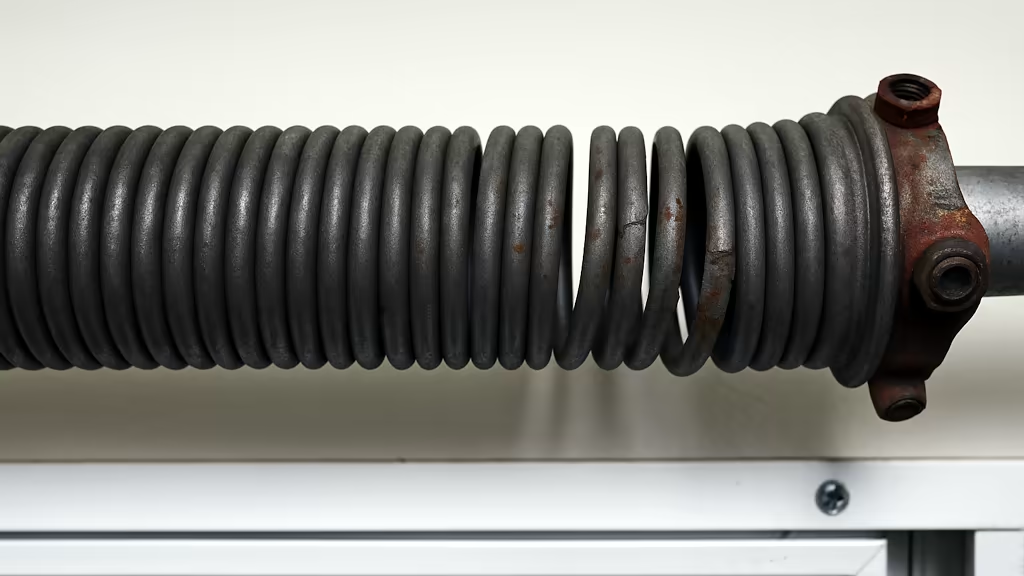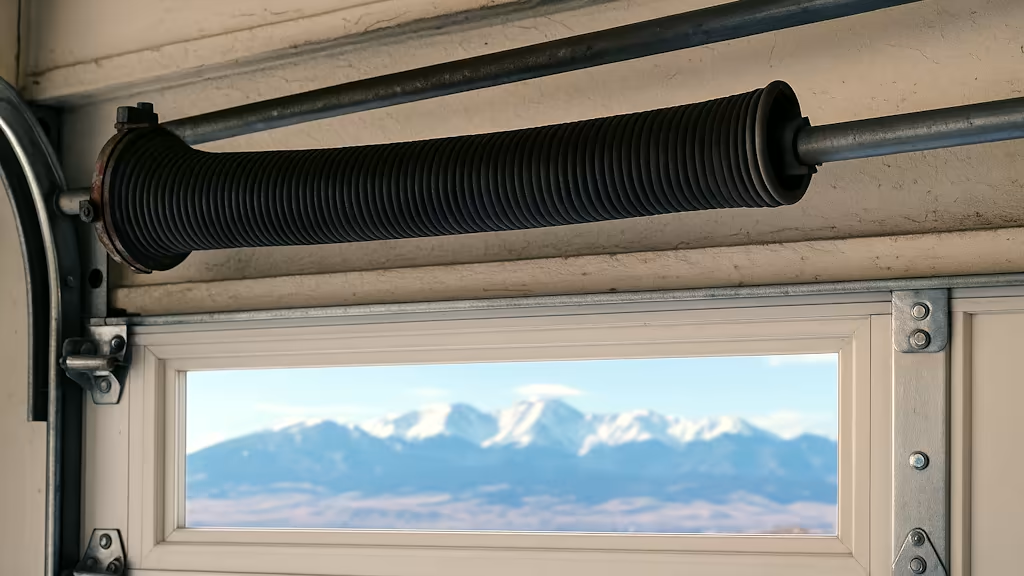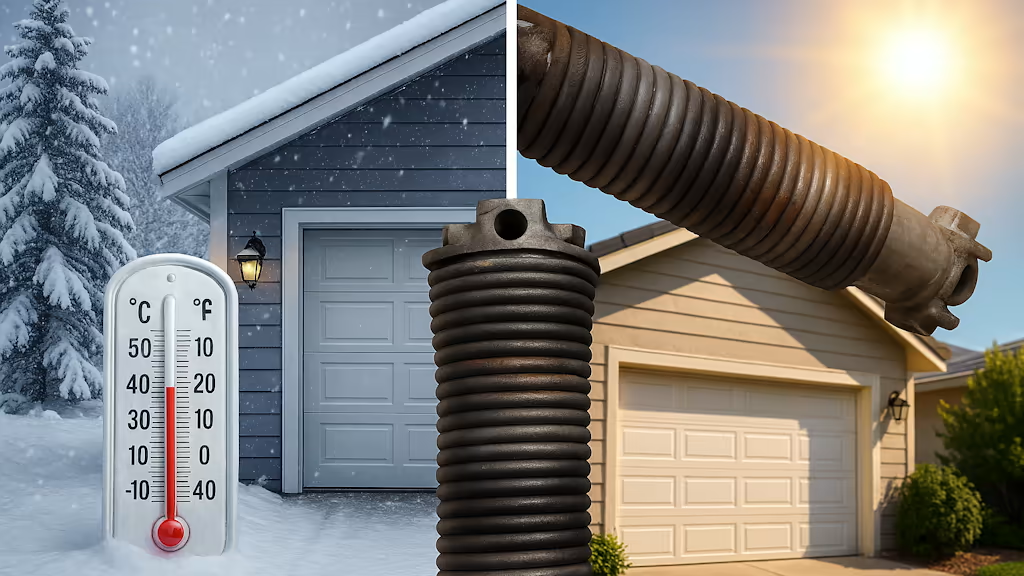Living in Denver means enjoying breathtaking mountain views, abundant sunshine, and a vibrant outdoor lifestyle. However, our unique Mile High environment creates specific challenges for home maintenance—including your garage door springs. These are among the most common garage door repairs there are. Understanding how Denver’s climate affects these critical components can save you from unexpected failures and costly emergency repairs.
How Denver’s Unique Climate Affects Garage Door Spring Longevity
Denver’s climate presents a perfect storm of conditions that can significantly reduce the lifespan of garage door springs compared to other regions:
Extreme Temperature Fluctuations
One of Denver’s most notable weather characteristics is its dramatic temperature swings—sometimes changing by 40-50 degrees in a single day. These fluctuations cause metal springs to repeatedly expand and contract, accelerating metal fatigue and creating microscopic stress fractures over time.
During winter, temperatures regularly drop below freezing, making the metal in your springs more brittle and susceptible to breakage. When a cold garage door is suddenly operated, the already-stressed springs experience additional strain, often leading to unexpected failures.
Low Humidity and Dry Air
Denver’s notoriously dry climate accelerates the deterioration of lubricants that protect your springs. Without proper moisture, lubricants can dry out quickly, increasing friction between spring coils and accelerating wear. This dry environment also contributes to faster corrosion when moisture does appear, particularly from winter road salt tracked into garages.
High Altitude Effects
At over 5,280 feet above sea level, Denver’s elevation creates unique physics challenges for garage door systems:
•Lower air pressure means less resistance, affecting how springs perform
•Springs may feel “stronger” or react differently than at sea level
•Standard spring tension calculations used at lower elevations may not apply
•The thinner air provides less efficient cooling for opener motors, adding strain to the entire system
Intense UV Exposure
Colorado receives approximately 300 days of sunshine annually, with Denver’s higher elevation intensifying UV exposure. This increased solar radiation can break down protective coatings on springs and accelerate deterioration of the metal itself, particularly for garage doors with southern or western exposure.
Average Lifespans for Different Spring Types in Colorado
Understanding the expected lifespan of your garage door springs helps you plan for maintenance and replacement before catastrophic failure occurs:
Torsion Springs
Torsion springs are mounted horizontally above the garage door opening and work by twisting to store energy.
•Standard lifespan: 15,000-20,000 cycles (one cycle = complete opening and closing)
•In Denver’s climate: 7-12 years with average use (3-5 cycles daily)
•With heavy use: 4-6 years (6+ cycles daily)
•Premium galvanized torsion springs: May last 30-50% longer
Torsion springs generally perform better in Denver’s climate due to their design and placement, making them the preferred option for most homes in our region.
Extension Springs
Extension springs run perpendicular to the door along the horizontal tracks and operate by stretching and contracting.
•Standard lifespan: 10,000-15,000 cycles
•In Denver’s climate: 5-8 years with average use
•With heavy use: 3-5 years
•Susceptibility to Denver conditions: Higher than torsion springs
Extension springs typically wear out faster in our climate due to their design and are more vulnerable to temperature fluctuations and dry conditions.
Warning Signs of Spring Failure Due To Denver’s Climate

Denver homeowners should be particularly vigilant for these climate-related warning signs:
•Visible gaps between spring coils: Indicates stretching from temperature stress
•Door feels heavier in winter months: Cold temperatures affect spring tension
•Uneven door movement after temperature swings: Springs responding differently to expansion/contraction
•Increased noise during operation: Dry lubricant causing friction
•Rust or corrosion spots: Result of moisture from melting snow combined with road salt
Tips for Extending Spring Life in High-Altitude Conditions
1. Choose the Right Springs for Denver’s Elevation
When replacing springs, work with professionals who understand Denver’s unique conditions:
•Opt for slightly heavier-duty springs that account for altitude stress
•Consider galvanized or powder-coated springs for better corrosion resistance
•Ensure proper cycle rating based on your household’s garage door usage
•Request springs specifically calculated for high-altitude installation
2. Implement a Denver-Specific Maintenance Schedule
Regular maintenance is crucial in our climate:
•Fall maintenance (September-October): Prepare for winter temperature extremes
•Apply fresh dry-film lubricant before cold weather sets in
•Check balance and tension before winter stress
•Inspect for summer UV damage
•Spring maintenance (March-April): Address winter wear
•Clean springs of road salt residue
•Check for winter damage and stress fractures
•Reapply appropriate lubricant for warming temperatures
3. Use Altitude-Appropriate Lubricants
Not all lubricants perform well in Denver’s conditions:
•Choose dry-film or silicone-based lubricants specifically formulated for low humidity
•Avoid WD-40 and similar penetrating oils that attract dust and dry quickly
•Apply lubricant more frequently than recommended in standard maintenance guides
•Wipe down springs to remove dust buildup that accelerates wear
4. Consider Garage Insulation and Temperature Control
Moderating your garage environment helps protect springs:
•Insulate your garage door to reduce temperature fluctuations
•Seal gaps around the door to maintain more consistent humidity
•Consider a garage heater for extremely cold periods if you use your door frequently
•Install weather stripping to prevent moisture intrusion
5. Adjust Usage Patterns During Extreme Weather
Simple behavioral changes can extend spring life:
•Allow extra warm-up time before operating the door in very cold weather
•Reduce usage frequency during extreme temperature days when possible
•Open the door manually during temperature extremes if you notice unusual operation
•Listen for changes in door sounds that might indicate climate-related stress
Professional Maintenance: Your Best Defense

While DIY maintenance helps, professional service is essential in extending the lifespan of garage door springs Denver’s challenging climate:
•Schedule annual professional inspections to catch altitude-related issues early
•Ensure technicians use Denver-specific tension calculations when replacing springs
•Ask about high-cycle spring options rated for Colorado’s conditions
•Keep records of installation dates and service to track performance in our climate
When to Replace Springs in Denver
Be proactive about garage door spring replacement in our region:
•Consider preventative replacement after 7-9 years, even without obvious failure
•Replace both springs simultaneously even if only one shows wear
•Schedule replacement before winter when possible to avoid cold-weather emergency failures
•Upgrade to higher-quality springs specifically designed for high-altitude environments
Call Metro Denver Garage Door for Garage Door Spring Repairs
Denver’s climate creates unique challenges for garage door springs, but understanding these factors helps you extend their lifespan and avoid unexpected failures. By implementing altitude-specific maintenance practices and working with professionals who understand our local conditions, you can ensure your garage door operates reliably year-round, regardless of what Colorado’s weather throws your way.
For professional garage door spring repair, inspection, maintenance, or replacement services throughout the Denver metro area, contact Metro Denver Garage Door at (303) 988-4801. Our technicians understand the unique challenges of our Mile High environment and provide solutions optimized for Colorado’s climate conditions.
Call Metro Denver Garage Door
From design services, maintenance, installation, and repairs, we have you covered.
References
Premium-galvanized torsion-spring life (30-50 % longer)
• Clopay – “Commercial & Residential Spring Selection Guide,” rev. 2023, pp. 6-7
Direct PDF: https://links.clopay.com/Flipbooks/Home_Depot/PPREPLACEMENTPARTS-12/pdf/REHD-PPREPLACEMENTPARTS-12.pdf
(Cycle-life table shows 20 000–25 000 cycles for the galvanized “Gold-Series” vs. 15 000 cycles for the standard oil-tempered line, equating to +33-67 %.)
• Raynor – DuraSpring® Engineering Brief EB-11-G (2024)
Direct PDF: https://raynor.com/wp-content/uploads/literature/DuraCoil.pdf
(Page 3 lists high-cycle, zinc-coated torsion springs rated up to 25 000 cycles; the ordinary spring column lists 15 000.)


